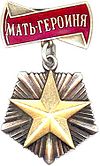
Mother Hero
Encyclopedia

Title
A title is a prefix or suffix added to someone's name to signify either veneration, an official position or a professional or academic qualification. In some languages, titles may even be inserted between a first and last name...
in the Soviet Union
Soviet Union
The Soviet Union , officially the Union of Soviet Socialist Republics , was a constitutionally socialist state that existed in Eurasia between 1922 and 1991....
awarded from 8 July 1944 to all mothers bearing and raising 10 or more children. The title was accompanied by the bestowal of the Mother Heroine Order and a certificate conferred by the Presidium of the Supreme Soviet of the USSR. It was awarded upon the first birthday of the last child, provided that nine other children (natural or adopted) remained alive. Children who had perished under heroic, military or other respectful circumstances, including occupational disease
Occupational disease
An occupational disease is any chronic ailment that occurs as a result of work or occupational activity. It is an aspect of occupational safety and health. An occupational disease is typically identified when it is shown that it is more prevalent in a given body of workers than in the general...
s, were also counted. The award was created simultaneously with the Order of Maternal Glory
Order of Maternal Glory
The Order of Maternal Glory was a Soviet civilian award created on 8 July 1944 by Joseph Stalin and established with a decision of the Praesidium of Supreme Soviet of the USSR....
(Russian: Орден "Материнская слава") and the Maternity Medal (Russian: Медаль материнства), intended for women with five to nine children.
Mother Heroines were entitled to wear a badge, which was a gold star with silver straight rays between the arms; it was suspended on a metal, red-enameled "ribbon" bearing the words "Мать-героиня". They were also entitled to a number of privileges in terms of retirement
Retirement
Retirement is the point where a person stops employment completely. A person may also semi-retire by reducing work hours.Many people choose to retire when they are eligible for private or public pension benefits, although some are forced to retire when physical conditions don't allow the person to...
pension, the payment of public utility charges, and the supply of food and other goods.
Around 430,000 women were awarded this title during its existence. The only man to be awarded the title was Veniamin Petrovich Makarov from Orenburg
Orenburg
Orenburg is a city on the Ural River and the administrative center of Orenburg Oblast, Russia. It lies southeast of Moscow, very close to the border with Kazakhstan. Population: 546,987 ; 549,361 ; Highest point: 154.4 m...
, who raised 12 adopted boys.
Post-Soviet republics
Following the dissolution of the Soviet UnionDissolution of the Soviet Union
The dissolution of the Soviet Union was the disintegration of the federal political structures and central government of the Union of Soviet Socialist Republics , resulting in the independence of all fifteen republics of the Soviet Union between March 11, 1990 and December 25, 1991...
the award was withdrawn in most post-Soviet republics.
- In the Russian Federation it was discontinued in 1991. As of 2004, a number of requests had been directed to the President of Russia for the restoration of all maternity awards.
- In TajikistanTajikistanTajikistan , officially the Republic of Tajikistan , is a mountainous landlocked country in Central Asia. Afghanistan borders it to the south, Uzbekistan to the west, Kyrgyzstan to the north, and China to the east....
it was withdrawn in 1996, to discourage large families. - In UkraineUkraineUkraine is a country in Eastern Europe. It has an area of 603,628 km², making it the second largest contiguous country on the European continent, after Russia...
it was cancelled upon independence but restored in 2004. - In KazakhstanKazakhstanKazakhstan , officially the Republic of Kazakhstan, is a transcontinental country in Central Asia and Eastern Europe. Ranked as the ninth largest country in the world, it is also the world's largest landlocked country; its territory of is greater than Western Europe...
, mothers of 10 or more children have since 1995 been awarded the Altyn Alka (Алтын алка, "Golden pendant") and mothers of eight or nine children have received the Kumis Alka (Кумiс алка, "Silver pendant").
See also
- Awards and decorations of the Soviet UnionAwards and decorations of the Soviet UnionAwards and decorations of the Soviet Union are decorations from the Former Soviet Union that recognised achievements and personal accomplishments, both military and civilian. Some of the awards, decorations and orders were discontinued after the dissolution of the Soviet Union, while others still...
- Cross of Honor of the German MotherCross of Honor of the German MotherThe Ehrenkreuz der Deutschen Mutter , referred to colloquially as the Mutterehrenkreuz or simply Mutterkreuz , was a state decoration and civil order of merit conferred by the government of the Deutsches Reich to honour a “Reichsdeutsche” mother for...
, the Nazi GermanyNazi GermanyNazi Germany , also known as the Third Reich , but officially called German Reich from 1933 to 1943 and Greater German Reich from 26 June 1943 onward, is the name commonly used to refer to the state of Germany from 1933 to 1945, when it was a totalitarian dictatorship ruled by...
equivalent, instituted in 1938.

